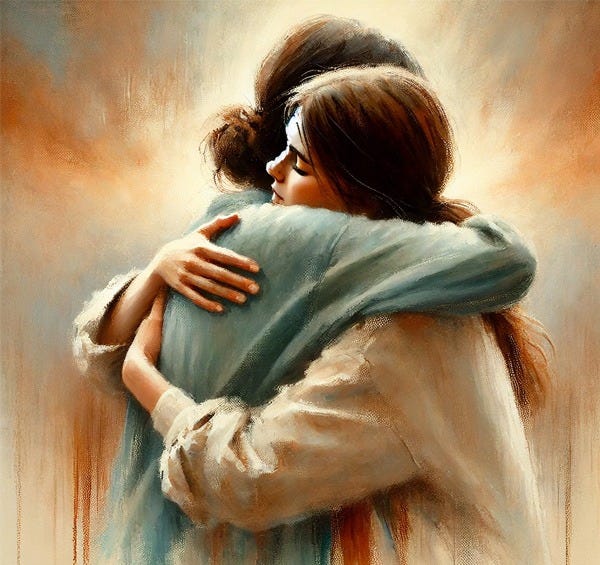Forgiveness Beyond Time and Space
Forgiveness is about finding the strength in my heart to say: I am at peace with what happened.
My grandmother passed away this August, ending five years of silence between us. Despite the distance, we were once incredibly close—she was like a second mother to me. In many ways, she was my favorite person. As a child, the highlight of my week was when she came to stay with us for the weekend. Fridays were magical because I knew she’d be waiting for me at home, and I wouldn’t let her sleep anywhere else but in my bed.
However, when I moved in with her later in life, I saw sides of her I hadn’t known existed—sides that hurt me and left me feeling used and betrayed. Our relationship unraveled, and an argument erupted, escalating to the point where neither of us reached out to the other again. What happened between us is not unique—many families experience these painful dynamics in one form or another. Over the years, people asked why I didn’t visit her or try to reconcile, “while you still have the chance,” they would say. The truth is, I did reconcile with her, just in a way that many don’t fully understand.
People often think of forgiveness as something you give to someone else—a gesture of reconciliation. But I’ve come to understand it differently. To me, forgiveness has nothing to do with the other person. Forgiving someone doesn’t require their involvement—it’s about finding the strength in my heart to say: I am at peace with what happened. I have accepted that I felt hurt, betrayed, or humiliated. Forgiveness, in my view, is not about excusing or erasing the past but about making peace with it within myself.
I felt deeply betrayed by my grandma, someone I adored. But in reality, I was upset because I had sacrificed parts of myself for her, expecting gratitude that never came. I was angry because I had put myself through those experiences for her sake. The forgiveness I needed wasn’t for her—it was for me. I forgave her to free myself from the burden of resentment. I didn’t want to carry those negative feelings, reliving the pain over and over. Forgiveness allowed me to release the past, but it didn’t mean I wanted to rekindle the relationship or return to the way things had been.
Dreams have always played a significant role in my emotional processing, and it was through them that I began to reconcile my feelings toward her. Two years before her death, I had a dream that felt like a turning point:
It’s the middle of the night, and I’m standing alone on a quiet street. A small car pulls up next to me, and my grandma steps out, smiling warmly as if nothing had ever come between us. She embraces me and asks, “How are you doing? Are you taking good care of the house?” I fake a smile and say “yes,” but inside I’m holding back tears. Eventually, I can’t contain them, and I start to cry. My grandma, unaware of the pain between us, doesn’t understand where these tears are coming from. But she pulls me close, sitting down on the ground with me. In that moment, I’m reunited with the grandma I once knew.
This dream was the first of many. Over the years, I continued to have dreams about her, and in those dreams, we worked through minor, unresolved issues. But in the weeks leading up to her death, I could sense a shift—her suffering was becoming more apparent. She visited me often in my dreams, and though we spent time together, I could feel her pain.
In the last dream I had of her before she passed:
I’m back living with my mom, and my grandma is visiting, just like when I was a child. But now, I’m my adult self. My grandma stands by the door, and my mom asks if she’ll spend the night. My grandma shakes her head and says she can’t stay—she’s in too much pain. We say our goodbyes, and I watch her walk away.
Not long after that dream, she passed away. It didn’t come as a shock—I had felt it coming. I was at peace, knowing that we had already healed the rift between us in my heart. Even now, I still feel her energy at times. But it’s different now—light and warm, free from the suffering she carried.
Forgiveness is a process—one that takes time, just like any kind of healing. It doesn’t require the other person’s presence, their apology, or even their awareness. Sometimes, it happens in subtle ways—in dreams, in quiet moments of reflection, or in a shift within ourselves that signals we’re ready to move forward.
If there’s one thing I’ve taken from this experience, it’s that forgiveness isn’t for the person who hurt you—it’s for your own heart. When we release that weight, we give ourselves the freedom to heal, and that, is the greatest gift of all.



